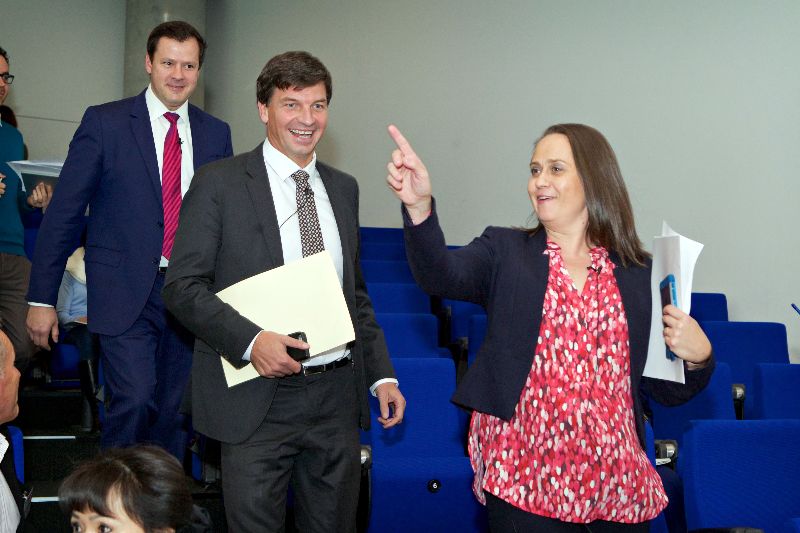Far from going backwards in the global stakes, Australia’s tech and innovation sectors are at a tipping point toward improved commercial success on world markets, according to Angus Taylor, the government’s point-man on digital transformation and cities policy.
Mr Taylor said the increased willingness of Australia’s capital markets to invest in innovation-based companies, the return to Australia of “several generations of battle-hardened entrepreneurs,” and the increased awareness in our research institutions of the importance of commercialisation were three reasons to be cheerful.
Speaking at the InnovationAus.com Innovation Policy Debate, Mr Taylor said improved access to capital and entrepreneurial skills had bolstered the local ecosystem. He pointed to the three recent and significant IPO’s on the local exchange as proof points for the positive outlook for the sector.

The ASX listings of Aconex co-founded by CEO Leigh Jasper, Redbubble led by founder Martin Hosking, and global logistics software powerhouse WiseTech led by founder Richard White, were proof-points of the growing strength in the supporting eco-system.
“These are three companies of significant scale, and great success. [They are] great IPOs here in Australia. They didn’t go to the US, they stayed here in Australia,” Mr Taylor said.
“[It demonstrates] our capital markets are now prepared to make significant investments, and these were three very significant investments,” he said.
“We have several generations now of battle-hardened entrepreneurs and venture capitalists. We have great universities, great research institutions and an increasing awareness of the importance of commercialising our great ideas.”
“So where does government step in? As someone who has come out of the private sector and who has been in the parliament for two-and-a-half years, I can safely say that we [in government] will never match the expertise of the entrepreneurs and the venture capitalists already doing the work,” Mr Taylor said.
Labor’s shadow spokesman for digital innovation and startups Ed Husic chastised government for the laggard pace of much of its reform, reminding the debate audience that government sat on its hands its first two years in office.
Taxation reform, venture capital reform, pushing superannuation funds to invest in higher-risk innovation portfolios and investing in skills had been on a slow-track, he said.
While Labor had been talking openly about its policies in these areas since the 2014 budget reply (and the two subsequent years), government had been sitting on its hands.
He said Labor had supported the tax changes that make angel investing and VC funds more attractive, but said the Coalition was stalled on the “talent-side”, talking up Labor’s policies to improve STEM teaching skills in primary and secondary schools to improve the pipeline of STEM tertiary entrants.
Further, he said entrepreneur visas and a scheme for graduate entrepreneurs was a good way to fast-track the proliferation of entrepreneurial talent across all sectors.
He also lamented Government’s blind-spot to ‘hard skills’ that startups need that rest outside of STEM. These would include things like UX design, or even improved access to core business management expertise.
Mr Husic also said it was important for the industry to better communicate innovation opportunities across the population. The #IdeasBoom campaign was missing its mark, he said.
While the tech and innovation sectors saw disruptive technologies in terms of opportunity, much of the rest of the population still saw it fearfully, as a direct threat to jobs and livelihood. And it was up the policy-makers – and the tech and startups sectors – to make sure that the opportunities were opened up to everyone.
Of course jobs would be impacted by disruptive technology. But Labor was placing greater resources of skills and training outside of university STEM graduate to make sure the benefits of these opportunities could spread more broadly, and so that more people could participate in the success of the industry.
In the meantime, Mr Husic said Australia needed to move fast to build on recent momentum.
“We have been saying this for some time, and now the government is getting on board with us too,” he said. “With both sides talking about it, I think startups recognise that there is a much more welcoming environment in Australia.”
With a vibrant and growing cohort of innovative local companies, Mr Husic said foreign were now getting more aggressive about luring Australian companies to foreign markets.
The UK Trade & Investment body was very active in Australia and “getting very aggressive” – hosting information nights at local co-working spaces and accelerators.
“Of course they are going to target our startups, and the reality is that we can’t stop people from leaving [if that’s what they want to do,]” Mr Husic said.
“Part of the reason why it might have been attractive to leave was because people didn’t believe they had options here: The work wasn’t celebrated, the money wasn’t available, and the skills and people weren’t here,” he said. “We needed to change that.”
“Chris Bowen was quoting the [StartupAUS] Crossroads report back in 2014 in his budget reply. And now that both sides of politics are talking about these issues, I think that startups will recognise that there is a much more welcoming environment,” Mr Husic said.
Do you know more? Contact James Riley via Email.

